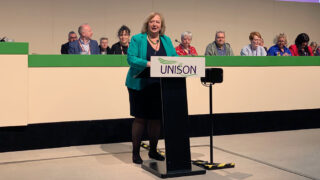UNISON is gearing up for November’s recruitment and retention drive, the union’s national executive council heard when it met in London this morning.
The meeting received an update on “very, very detailed plans” from regions and all parts of the union on plans for the month-long activity.
The NEC update on the “Grovember” campaign came at the same meeting that heard encouraging news on recruitment, which showed increases in July, August and September this year over the same period in 2017.
But, the meeting heard, the union still needs to recruit more and retain the members it already has, to grow and strengthen the voice of workers in public services.
And with the union marking it’s 25th anniversary this year, assistant general secretary Liz Snape asked: “What better year to turn a series of slight increases into real growth?”
Find out more about the recruitment drive
The need for – and the effect of – the strength of a growing union was highlighted in general secretary Dave Prentis’s report, when he spoke of “successful industrial action, not just in one region but across the whole union”.
He cited the “major victory” at the Wigan, Wrightington and Leigh NHS trust, when action by UNISON members across three sites saw the trust abandon plans to transfer work and staff to a wholly owned subsidiary company that it wanted to set up.
Other trusts in England have backed off from plans for similar so-called ‘subcos’, while action continues in Bolton where workers transferred to one of these companies last year are being refused the NHS Agenda for Change pay rise.
Mr Prentis described this as “immoral”, adding: “We can’t allow this to happen.
“We negotiated a national pay agreement in the NHS, where the lowest-paid members benefit most,” he said. “Then the employers try to take them out of the agreement.”
But high profile disputes over subcos across England, from the south west to the north east, saw NHS Improvement call a halt to all the plans to set them up.
And “it is UNISON and UNISON alone that has brought about the pause in these subcos,” said Mr Prentis.
Find out more about the union’s campaign against NHS subcos
But creating, and transferring staff to, subsidiary companies isn’t just a health issue, the NEC heard, with examples at universities and in local authorities. At the same time members are also dealing with traditional outsourcing contracts, such as the traffic enforcement officers employed by NSL in Camden, North London, who are taking strike action for fair pay.
Mr Prentis also made a point of name checking the long-running strike action by Birmingham care workers against their Labour council’s plans to cut their hours and pay. Then there is the strike by 8,000 low-paid women in Glasgow taking action to demand equal pay next week.
“We’ve been to court, UNISON has won, and now the council is dragging its feet and just not paying,” said Mr Prentis. “Our resolve is we will not leave 8,000 women by themselves: this is a strategic dispute for this union.”
The same is true of the nine school dinner supervisors on indefinite strike in Grimethorpe, Barnsley, over their schools plans to make them redundant and transfer the work to teaching assistants.
The members involved in all these disputes, and others such as the refuse collectors in Kirklees, West Yorkshire, have beaten the Trade Union Act and its limits designed to stop action, M Prentis pointed out.
He said he was proud to stand alongside many of them on picket lines. Just as he was proud to receive thanks from the Living Wage Foundation at the Labour Party conference for the time in July when 100,000 workers became recipients of the living wage in a single day – thanks to the NHS England pay deal coming into force – the largest single increase in people receiving the living wage in the Foundation’s history.
“This is a flavour of what we’ve been about in this union for the last two months,” the general secretary added: “Supporting our members who are putting their heads above the parapet.
“It’s important that we have the membership density in workplaces – which is why the recruitment and organising agenda is so important. We have to have the density to break the horrors of austerity which are still a reality for our members.”
The NEC voted to send messages of support and solidarity to members involved in all these disputes, as well as three anti-fracking demonstrators whose jail sentences were quashed in the Court of Appeal as the NEC met.
The executive also:
- received updates on recruitment and organising, pay campaigns and industrial action across the union;
- approved the union’s accounts for the first eight months of the year.





